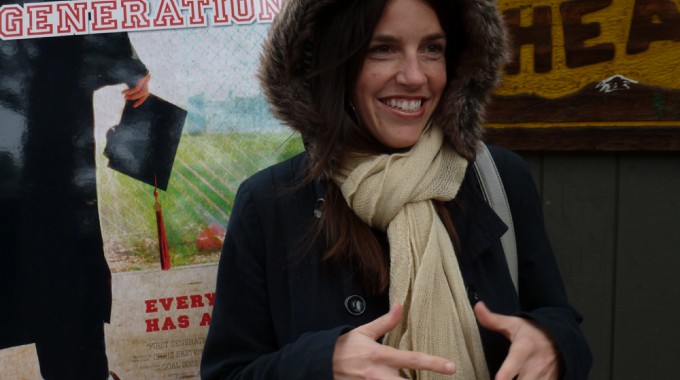If you know of a Columbia College student, faculty member, alumnus/alumna or program we should spotlight, or if you would like to submit a story, please contact:
Columbia College
Office of Communications
cc-comms@columbia.edu

Jaye J. (Pace) Fenderson ’00 had little help with the college admissions process. She is trying to change that for prospective college students.
As a lower-income student from a large public high school, Jaye J. (Pace) Fenderson ’00 had little help with the college admissions process. Fenderson’s mother was just starting college when she was in high school, and they didn’t have money for an SAT prep course or to go on any college tours. Fenderson didn’t even meet her guidance counselor until her senior year.
But Fenderson wanted to attend a top-notch college, so she worked hard and she made it. Only later, after taking a job at the Columbia admissions office, did Fenderson realize how lucky she had been and how uneven the playing field is for students like her.
Now Fenderson, author of Seventeen’s Guide to Getting Into College: Know Yourself, Know Your Schools & Find Your Perfect Fit! (2008), has made a film about the difficulties of applying to college without adequate resources or information. The film, First Generation, tells the stories of four low-income high school students striving to be the first in their families to go to college. For Fenderson, it is the culmination of a decade devoted to helping students with the admissions process so that they don’t have to rely on just getting lucky to get into college.
“Once I worked in admissions, I felt enormously fortunate that I had got into Columbia,” Fenderson said. “I developed a heart for public school students, especially low incomes students who didn’t have lot of access or information about applying to college.”
Fenderson, an English and French major, started working in the Columbia Office of Undergraduate Admissions as a work study student during her junior year in the College, and took an entry level admissions officer position after graduation. She had wanted to work in entertainment, she said, and was excited to help produce an undergraduate admissions video. But while there, from 2000 to 2002, she also found a new passion: increasing college access for low-income students.
When she visited private or elite public schools, Fenderson said, she was amazed by the resources students had to help them get into college: guidance counselors who wrote extensive personal recommendation letters, parents who had taken their kids on cross-country college visits, test prep classes and private counselors.
In lower-income communities, she said, students couldn’t compete. While some students appeared to be stellar candidates and had great potential, they didn’t know how to articulate themselves on college applications. Their SAT and ACT scores weren’t as good as their peers in wealthier communities, and most had only taken the test once, compared to three or four times for higher-income students. Their applications were also disjointed, without a clear message in essays and activities. And some students weren’t even applying to top schools because they didn’t understand how to apply for financial aid or think it was available to them, Fenderson said.
“It made me think that if they had someone in their life counseling them early on about the college admissions process, it would have made a real difference in terms of their opportunities.”
Fenderson started thinking about the different ways to reach these students. And in 2005, she found a way, developing a television show called The Scholar, an unscripted television drama that ran for one season on ABC. The show gave 10 high-achieving, economically disadvantaged high school seniors the chance to compete for a four-year scholarship to the college of their choice. Fenderson also started writing a weekly college advice column for Seventeen.com and published numerous articles on college admissions for Seventeen, Good Housekeeping and The College Access & Opportunity Guide.
Fenderson got the idea for First Generation when casting students for The Scholar. Most of the Scholar students, she said, were from low-income backgrounds and were the first in their families to go to college. In 2007, she convinced her husband, Adam, who had recently graduated from the USC School of Cinematic Arts to work with her on the film.
“I found the [stories] to be very compelling,” she said. “We spent the last four years working on it. It was kind of a crazy adventure.”
The film follows four students — an inner-city athlete, a small-town waitress, a Samoan warrior dancer and the daughter of migrant field workers — from different parts of California through their junior and senior years of high school and one year after graduation. To finish the film, the Fendersons received funding from the Lumina Foundation, an educational nonprofit dedicated to increasing access to and success in college.
“We tried to pick students that would be nationally representative of students across the US,” Fenderson said. “They’re different cultures too. You get a sense of how different parents and communities deal with going to college.”
The film premiered at the Heartland Film Festival in October, and was shown at the Napa Valley Film Festival in November and the Idyllwild International Festival of Cinema in January, where it won “Best Documentary” and “Best Soundtrack.” The film will be screened at the University of Southern California, Penn and NYU this spring. The Fendersons are hoping to show it in high schools across the country, and have developed a curriculum about the college application process to go along with the film.
For Fenderson, the film is a personal journey that started with her own experience as a lower-income student at Columbia.
“Going to school at Columbia just changed the trajectory of my life. I didn’t expect to work in education after I graduated. But doing so just opened my eyes,” she said. “I felt really lucky that I ended up at Columbia and I was able to get such a great education.”